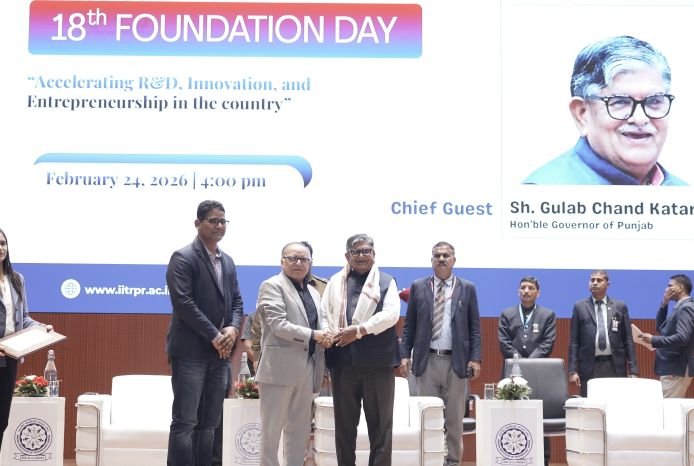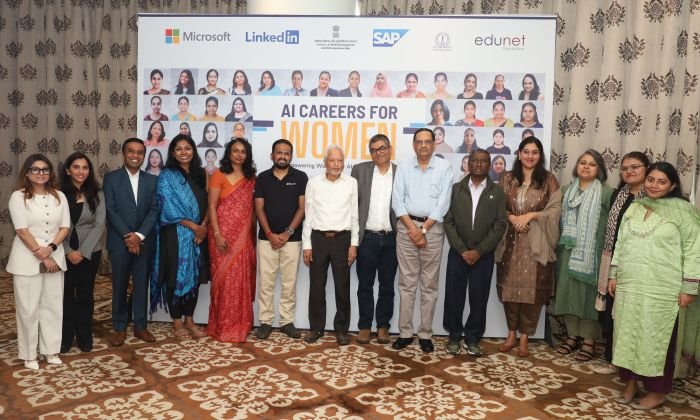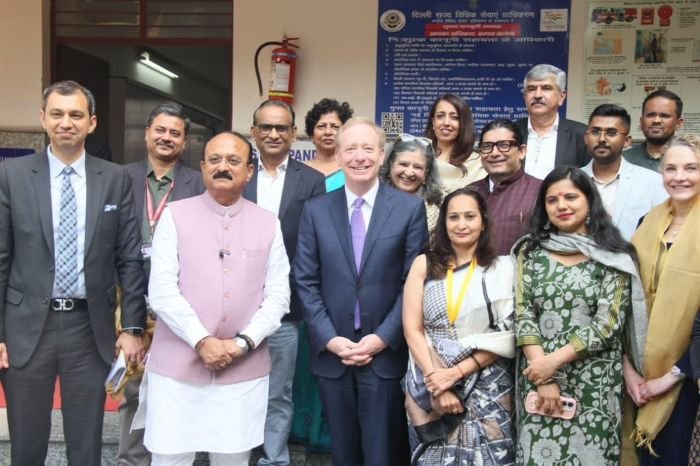
The two-day conference is underway in Delhi on April 26-27 and is celebrating NPSC’s journey into the golden jubilee year as a milestone. The Golden Jubilee Celebrations has also the undercurrent of G-20 as India holds presidency of G20 for this year even as the conference deliberates and discusses several contemporary themes on changing school education landscape in India under the larger theme of human centric education for a sustainable world, a report
The National Progressive Schools’ Conference (NPSC), an association of top 310 CBSE-affiliated schools across India, established in 1973, is having its golden moment as it is celebrating its 50th year with pride, reflection on the past and seeking future pathways. This year’s annual conference of the association therefore assumes much more significance and expectedly organizers are putting their heart and soul to make this into a milestone and memorable event.
The plenary session set the tone of the conference with keynotes from seasoned bureaucrat B.V.R. Subrahmanyam, CEO, NITI Aayog and Yuraj Malik, Director of National Book Trust (NBT), alongside Marco Teixeira, UNODC Representative, Regional Office for South Asia & Maureen Welch, Former Director, Asia Education Foundation.
NITI Aayog CEO, Subrahmanyam’s message of India’s rise set the context for reimagining the role of school education by schools, teachers and students themselves. He said with India becoming the most populous country of the world, there is a critical role for education system to turn this momentous development into an opportunity for reaping demographic dividend. “We are at a the cusp of development having left shortages behind and moving to become the third largest economy in next 25 years with potential of phenomenonal growth and remaining a youthful nation for the next 20-25 years,” he said while adding that in the worst case scenario India’s economy will be $30 trillion from the current $3 trillion and the per capita will rise to $20K. “However, this has big ‘if’ we can handle the challenges right.”
Subrahmanyam said India’ rise is benign as it has been a peaceful country with a heritage rooted in seeing world as the one family. “Be proud of India, our heritage, it is going to be the best years for the country after a fairly long time, may be the next 50 years even be better,” he hoped. He also told NPSC to be proud of itself for its school education leadership. “Your member schools are influencers for the more than 25 crore children of this country, you are at the frontier pioneering things, other systems pick up part and portion from your innovations,” he added.
NITI Aayog chief also touched upon his organization’s engagement with education institutions and students through Atal Tinkering Labs and Atal Incubation Centres under Atal Innovation Mission (AIM). “These have been created to break barriers and building confidence among student at handing technology. Even if a fraction of them became innovators, it will be a big change. We need many more unicorns and innovations to handle our challenges,” he said.
Subrahmanyam talked about the importance of education, India’s knowledge and skills heritage, challenges of employability, sustainability and challenges for schools. He also informed that Niti Aayog has started a new division to look at future of work.
Yuraj Malik, Director NBT, who followed Subrahmanyam’s inspiring pep talk, talked about the power of book and teacher. Setting context for his passionate address he called teachers the unsung heroes of society. Quoting Chankya on teachers, he said the polymath had said that teachers are never ordinary, either they are builders or destroyers. “Next 20-25 years are crucial for India to have economic, social, cultural sustainability and for this teachers and schools have a role to play,” he added. Malik said that having balance is crucial for survival and therefore education needs to strive for providing four quotients to students in stages—Intelligence quotient (IQ), Emotional Quotient (EQ), Tech Quotient (TQ) and Spirituality Quotient (SQ). He said that children are at the centre of NEP 2020 and the policy is an important document after 200 years of Macaulay.
“India matters now and next 25 years are critical. We need to believe, we can do it,” he said, while adding to reducing attention span among students to 31 sec is a challenge and idea is the new engine. Talking about books, he cited how Bhagat Singh became a legend because of his thinking and love for reading books. He urged schools to promote book culture in their schools and offered NBT’s support.
Earlier in her welcome address, Dr. Sudha Acharya, Chairperson, NPSC and Principal, ITL Public School, Delhi, recalled how NPSC came into being with an association of the then few progressive school leaders who invested untiringly, collaborated unflinchingly and worked unconditionally to make it grow to incredible heights. “Steadfast in pursuit, overcoming challenges, holding the team together and taking innovative strides, is what led to the realisation of our moto – ‘Quality, Commitment and Excellence’ in education. Reflecting on the long history of NPSC, I’d like to acknowledge all the former chairpersons who had collectively built, shaped and nurtured it, with their continued commitments- the golden commitments. It is said: Yat bhavo tat bhavati, meaning you become what you believe. On the occasion of this iconic year, we extend our collective gratitude for your conscious efforts to believe in what was still to be discovered. As in the mind, so is the speech; as is the speech so is the action.”
She said that the overarching idea of the conference is to make India’s stint at G 20 Presidency a grand success, showcasing India in ways befitting its stature and glory. The theme of India’s G20 Presidency – “Vasudhaiva Kutumbakam” – “One Earth. One Family. One Future”, conveys a powerful message for the learning landscape. Education is at the heart of G-20 & we the ideating leaders & mentors are the harbingers of change. Keeping this essence alive, the theme of this year’s NPSC Golden Jubilee Celebrations has the undercurrent of G-20.
She added, sustainability has been on the cards for its growing concern, for almost a decade now. The theme for this year’s conference is developed around – DESIGNING HUMAN CENTRIC EDUCATION FOR A SUSTAINABLE WORLD. Human Centric education respects the intrinsic value of the whole child and wellbeing, focussing on those values that can be described as human, including curiosity, care, compassion, relationship and responsibility. It is a systemic shift that aligns educational structures, policies, practices and learning experiences around the wellbeing of all the stake holders in the education ecosystem.
A series of sub themes which fervently touches upon the new paradigms in the learning landscape including the NCF 2022 that entails a critical shift in mindset were discussed by experts. NIEPA chancellor, Prof M C pant and Head of RMSA cell, NCERT, Dr Ranjana Arora explained the pancha kosha, a journey from Annamaya to Anandamaya Vikas and spoke about the 13 curricular goals contained the NCF.
Navigating the Tech Frontier for shaping the future of learning highlighting the widespread digital innovation, where AI is constantly making inroads for future of school education is lined up for day 2 of the conference. Also a session on Financial Literacy for a Balanced and Inclusive Ecosystem aims to create a workforce that understands the importance of sustainable investing and drives a change, while the session on Realising SDG, the life force for change, will take the audience through an aesthetic presentation of an ancient dance form “chhau”.
The Valedictory Session on the theme-Globalising Indian Knowledge System as a Living Tradition will be delivered by Arif Mohammad Khan, Governor of Kerala
By Autar Nehru








